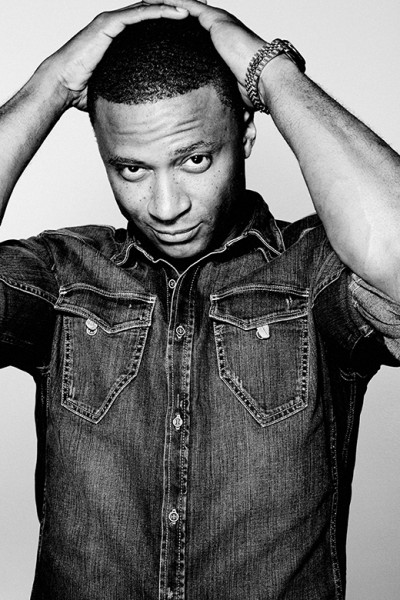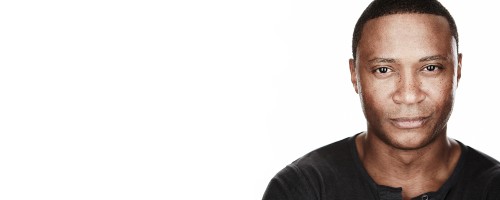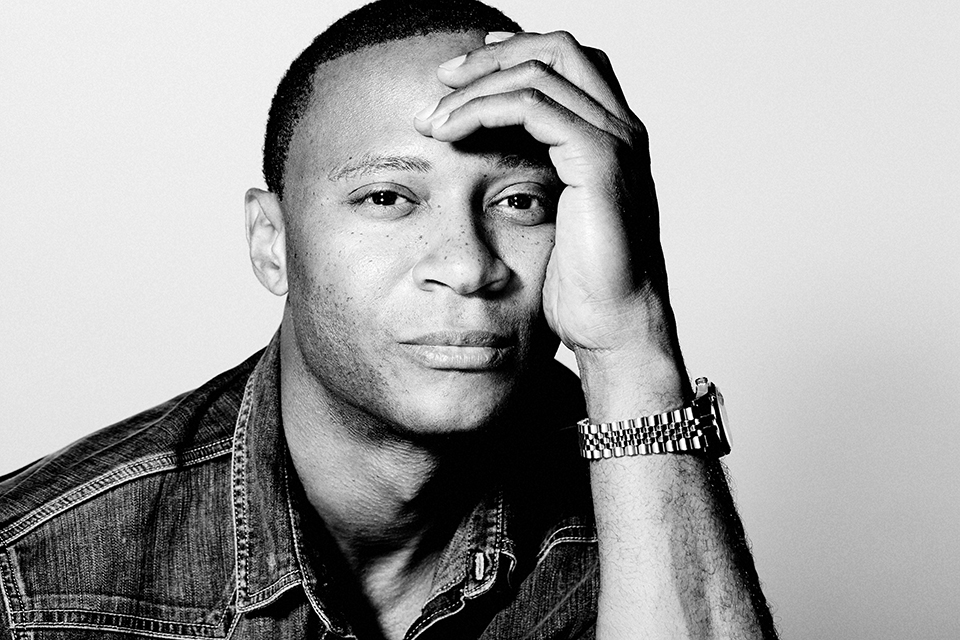David Ramsey showed very few leanings towards becoming an actor back in 1987.
“Don’t believe everything you see on IMDB (Internet Movie Data Base), that first credit is not even me,” he quips in response to a cast summary from that same year, which placed him on a dreadfully b-horror film titled Scared Stiff.
Contrary to the Internet’s view of events, Ramsey’s feet were nicely settled in his hometown, Detroit at the time, with lofty hopes of becoming a football player.
“I tried a million different ways to get that off of IMDB and Wikipedia,” he recalls. “It will just not leave, I don’t know why.”
His opinions? Unfiltered. His verbiage? Relatable.
“When I realized I didn’t have to get hit in order to get girls, I said, ‘forget that [football], I’m going to be an actor.’”
He consistently speaks with a genuine honestly and humility that breathes life into his responses much like it did for his long running role as John Diggle on the hit superhero series “Arrow”. While Ramsey’s acting credits have stemmed across celebrated TV shows such as “The West Wing”, “Dexter” and “Blue Bloods”, John Diggle has become a fan favourite protagonist that provides a normalcy to the wide array of masked heroes that embody the CW based series.
It’s a character that’s arguably a reflection of David Ramsey’s own thoughts, ideas and personality.
SO SCARED STIFF WAS OBVIOUSLY NOT THE ONE ROLE WHERE YOU KNEW YOU MADE IT SINCE YOU WEREN’T IN IT. TELL US ABOUT THAT ROLE THAT MADE YOU SAY, YES, YOU CAN DO THIS. It was back in ’96, I’m going to go back, but not as far as ’87. For those that remember there was this network called UPN (United Paramount Network), LL Cool J had a show on there, Brandy had a show called “Moesha” on there, and I had a show called “Good News”. It was from the same creator of “Amen” and [“The Cosby Show”], Ed. [Weinberger]. He wrote the show about this preacher and we left for a little over a season, and that’s really where I saw my big huge break into television.
YOU’VE PLAYED A VARIETY OF CHARACTERS SINCE THEN. IT STANDS AT WELL OVER 60 ROLES. DO YOU HAVE CRITERIA YOU GO BY, IN TERMS OF THE CHARACTERS YOU CHOOSE TO PLAY? It all starts with the writing. Film and television is not really an actor’s medium, theatre is an actor’s medium. That’s where the actor really controls what’s going on. That’s within the confines of the theatre. Outside of that it’s extremely collaborative with the editors, the writers, the director and when you’re dealing with episodic television and feature films it really becomes about the scale and the network, about what they want. So you always kind of struggle as an actor to kind of keep your stamp on the character. It really comes down to what words you’re saying, what’s coming out of your mouth, the development of the character. I don’t really look at a character and say, ‘I can’t play him,’ as much as it is, ‘is it written, and can I find the human element, can I find what I can identify with within this character?’
Guys who joined the military, they got out and now they’re security guards. That’s who John Diggle is … He calls Oliver on his BS and he’s just regular and I think that’s what people tune into. They look at John as themselves. Anybody can be John Diggle.
WHEN IT COMES TO “ARROW” IT SEEMS LIKE PEOPLE IMMEDIATELY LIKED YOUR CHARACTER, JOHN. WHY DO YOU THINK THIS IS? It’s who people identify with. This was a dude that was raised in the ’hood. He joined the army; he became an army ranger, did four tours of Afghanistan, he retired and then went into private security. I know guys like that in real life from Detroit. I know people like that. Viewers know people like that, their friends know people like that. Guys who joined the military, they got out and now they’re security guards. That’s who John Diggle is. He got a little discouraged from being private security and felt like he lost his purpose. He met Oliver Queen and he found his purpose again. So he’s just a regular dude. Everybody else around him are superheroes and then you have this guy who calls it the way it is. He calls Oliver on his BS and he’s just regular and I think that’s what people tune into. They look at John as themselves. Anybody can be John Diggle.
WHAT’S IT REALLY LIKE BEING A PART OF THIS WHOLE SUPERHERO TREND? That’s a good question. Right now we’re in a superhero renaissance. There’s so many shows about comic book characters and you just ride the wave. Part of the business is that the business itself gets on a train. Right now it’s the superhero train. Who knows how long that’s going to last. For me, right now it starts with the writing, and the writing and production value is really good on “Arrow”. As long as those two things stay good and the audience still likes the show, I’m going to ride this train until the wheels fall off.
 SO NATURALLY, GIVEN THE TIME YOU’VE PUT INTO THIS ROLE, ARE YOU IN ANY WAY PREPARED TO BE KILLED OFF? HOW DO YOU DEAL WITH SOMETHING LIKE THAT? You asked the million-dollar question. Well, you try not to even think like that, you do the best work that you can. At the end of the day you can’t work and be scared of not working at the same time. You can’t do both; you just have to do the work. Even though I, as an actor, have it at the back of my head, ‘Ok, what could happen?’ I’m not really thinking about that as I’m working. I just throw that out my head and do the job. That’s always a possibility man, that at any moment, you gotta find another job. That’s just the life of an actor.
SO NATURALLY, GIVEN THE TIME YOU’VE PUT INTO THIS ROLE, ARE YOU IN ANY WAY PREPARED TO BE KILLED OFF? HOW DO YOU DEAL WITH SOMETHING LIKE THAT? You asked the million-dollar question. Well, you try not to even think like that, you do the best work that you can. At the end of the day you can’t work and be scared of not working at the same time. You can’t do both; you just have to do the work. Even though I, as an actor, have it at the back of my head, ‘Ok, what could happen?’ I’m not really thinking about that as I’m working. I just throw that out my head and do the job. That’s always a possibility man, that at any moment, you gotta find another job. That’s just the life of an actor.
WELL YOU’VE BEEN IN A SERIES THAT’S GOING FOUR SEASONS STRONG, THAT’S A LOT OF TIME TO FORM BONDS AND GROW ATTACHED TO A CHARACTER. WHAT WAS YOUR EXPERIENCE LIKE WORKING ON THIS SHOW FOR FOUR LONG YEARS? It’s been great man. Listen, I didn’t know it was going to be this big, I gotta be real. The guy who wrote “Arrow”, Greg Berlanti, he called me up one day about “Arrow” and said, ‘We’re doing this comic book series, we really want you to do this role, John Diggle, he doesn’t do a lot in the pilot, but he’s going to become very important in the show,’ so I said, ‘cool.’ Got the role, did the pilot, and man, it just blew up. I didn’t know it was going to be this big, no one knew it was going to be this big, so how does this feel? It feels great, but I’ve been in this business for a long time. I’m always just a little bit paranoid and I’m always wondering when this is going to end. I’ve seen shows come and go. So I’m always looking over my shoulder with the thought of whether this show is going to end at some point. But it seems like there’s no end it sight, because it just keeps getting better and better.
That’s what this industry is many times. It’s institutionalized to simply look past people of colour. In a situation like that where you see people of colour getting work, people are institutionalized to think that something is wrong with that, when in reality there’s nothing wrong with that, it’s just good work.
GIVEN THAT YOU’RE A BLACK ACTOR WORKING IN THIS INDUSTRY, IN REFERENCE TO AN ARTICLE WRITTEN BY NELLIE ANDREEVA ON DEADLINE THAT STATES THERE IS POSSIBLY TOO MUCH ETHNICITY GOING ON IN HOLLYWOOD AT THE COST OF QUALIFIED CAUCASIAN ACTORS, WHAT IS YOUR TAKE ON THAT WHOLE ARGUMENT? I have a knee jerk reaction to that, but if I sit back and think about it, I honestly think that the editorial in question is completely off base. The idea that there is not enough work for Caucasian actors in this town, in this industry, is just completely off base. “Empire” is a great show; it’s a well-written show. Chris Rock said, ‘one thing at a time,’ and the more I work in this business the more it’s true. Don Cheadle also said something to the same degree, ‘I wouldn’t call it racism in this business, I’ll call it institutionalized overlooking,’ and that’s what this industry is many times. It’s institutionalized to simply look past people of colour. In a situation like that where you see people of colour getting work, people are institutionalized to think that something is wrong with that, when in reality there’s nothing wrong with that, it’s just good work. They role something good for people who so happen to be Black. Those people could have been Asian, or White, good writing is good writing. The idea that you have some hit shows on television that so happen to be Black is somehow taking away from Caucasian actors is just another example of institutionalized overlooking and entitlement that some people seem to have. That particular editorial represents a small minority of people within this industry and I wouldn’t give it the time of day.
SO IGNORING THAT EDITORIAL, DID YOU PERSONALLY HAVE DIFFICULTIES BREAKING OUT IN THIS BUSINESS GIVEN YOUR SKIN COLOUR? Yeah. I grew up in Detroit, I came out to LA back in ’93 or ’94, so I’ve seen a lot in the business. I’ve been on every audition where they said, ‘Hey, can you be blacker? Can you be less black?’ I’ve gone through all of that like anybody else, like a lot of Black actors have. It’s perseverance man. When I first got here back in ’94, my agent that I had told me that the cream rises to the top and as you keep on knocking, eventually the door opens and you can’t stop. A lot of it has to do with perseverance and the mentality that you will continue to grow as an artist. You’re learning from everything. You learn from every situation. If you have that mentality that you’re a student of the game as well as an innovator in the game, then work will come. That’s been my experience if you’re here for the long haul. It’s all good. It’s been a great ride for me, a great experience. It took a while, it took a lot of bumps and bruises, but it made me who I am and I’m happy to be here.





Comments are closed.